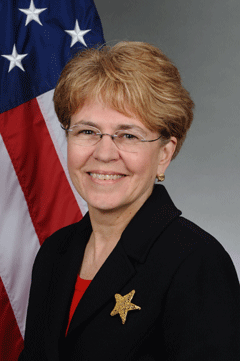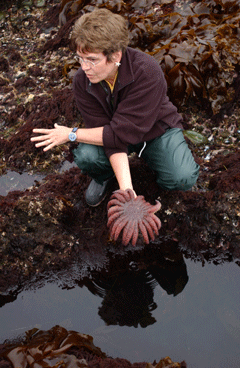Lubchenco’s Climate Service
Air Date: Week of May 8, 2009
 |
NOAA Administrator Jane Lubchenco wants to start a National Climate Service to help farmers, fishermen and city planners better deal with the coming challenges from a changing climate. Host Jeff Young sat down with Lubchenco to get her thoughts on how science should guide our decisions on climate change.
Transcript
[THEME]
CURWOOD: From the Jennifer and Ted Stanley studios in Somerville, Massachusetts, this is Living on Earth. I’m Steve Curwood.
YOUNG: And I’m Jeff Young in Washington.
If Mark Twain were still with us he might say, “Everybody talks about the changing climate but nobody does anything about it.”
Well, Jane Lubchenco does plan on doing something about it. She’s the marine scientist President Obama chose to lead NOAA, the National Oceanic and Atmospheric Administration. Lubchenco wants NOAA to start a National Climate Service—sort of like the National Weather Service, only this would forecast what climate change might mean for regions of the country over the coming decades.
I caught up with Lubchenco here on Capitol Hill just after a congressional hearing on that proposal. She says we can no longer rely solely on past experience to guide our decisions on basics like agriculture, water and land use.
LUBCHENCO: We have designed our cities, planted our crops, designed pretty much everything based on the expectation of some reasonable predictability in our climate system. We’re seeing now that the climate is changing. It’s getting warmer and more variable. We’re seeing more extreme precipitation events, floods and droughts. We’re seeing sea level rise, ice caps melting. And all of those are telling us that the climate is changing and changing in ways that are different from what it used to be.

Jane Lubchenco. (Courtesy of NOAA)
YOUNG: Yeah, I’m guessing, if I’m say- someone who deals with a water district in California, and I’m hearing all this scary stuff about the snow pack being gone I’m probably on the phone saying, help me out here, what should we do?
LUBCHENCO: That’s exactly right. And changes from snow pack to rainfall have huge implications for not only what the amount of water is throughout a year, but when it’s available, and those kinds of fundamental changes in the availability of water are so basic to planning, not just for city managers, but for agricultural, for traffic on rivers, how to think about droughts, floods, fire, insect outbreaks - the ability to have an idea of what’s down the road, even though it’s not super precise, is immensely useful in planning. So there are lots and lots of requests now - by water managers, by city planners, and others - for information, and there’s no one place they can go.
YOUNG: As I understand it, we have a pretty good grasp of what climate change might mean if you’re talking about a really big chunk of land or ocean, and a really a long time scale. But if I’m a community planner, or an agricultural planner, a fisherman, what have you, that doesn’t do me much good. How local can we get, and how useful can we make that information?
LUBCHENCO: It’s relevant to take stock of how much our capacity to model has improved through time. It used to be the case that climate models were just the entire earth--the whole thing as a single unit. Well fast forward to the present and we have the ability to have models that are at the scale of a continent. And that is a very significant advance. We would like to push that envelope and to go as rapidly as we can to be able to deliver information at the regional scale for the twenty to fifty year time horizon, because that’s the type information we need and it, in fact, we believe, is doable.

Marine biologist Jane Lubchenco at work. (Courtesy of Oregon State University)
YOUNG: Jane Lubchenco was a natural choice for NOAA. She spent decades trying to further our understanding of how we’re affecting our oceans and atmosphere.
She’s among the country’s most respected marine ecologists. Her work is regularly cited by other scientists and won her a Macarthur “genius” grant.
But she’s no ivory tower academic. Lubchenco’s also worked to make policy reflect the science. Of course that’s a now a big part of her job at NOAA--advising the president and testifying before Congress. And she steps into that role just as Congress starts a high stakes fight over what to do about climate change.
LUBCHENCO: I think it’s unrealistic to expect everybody is going to agree on everything, that’s just not the way democracy works. The challenge for science is to communicate what is known by scientists in a way that is as accessible and user friendly and credible. And in this case I think the evidence is overwhelming that climate change is unequivocal. It is time to act and to reduce those greenhouse gas emissions that are causing climate to change.
YOUNG: Do targets the Obama administration is putting forward for reducing greenhouse gases, are they up to the challenge?
LUBCHENCO: I believe targets that the administration has put forward are appropriate targets. It’s not clear what exact right amount is. It is clear we need to get on with it and reduce emissions as rapidly as possible.
YOUNG: I wonder though if the public shares the sense of urgency about this that I gather you have. I heard you speak at the National Academies, and you quoted the Rev. Dr. Martin Luther King.
LUBCHENCO: We cry out desperately for time to pause in her passage, but time is deaf to every plea. Over the bleached bones and jumbled residue of numerous civilizations are written the pathetic words, “too late”
YOUNG: That sounds like a pretty urgent message.
LUBCHENCO: Dr Martin Luther King was referring to what he called the ‘fierce urgency of now’ and I do believe there is intense urgency in addressing climate change.
One thing I think we need to appreciate is the fact that there will be a lot of surprises as climate system is changing. One of those surprises that emerged recently has been the increasing acidity of oceans. As oceans absorb CO2 they become more acidic. That has serious consequences for life in the oceans and in turn for people because we rely on oceans for so many things. There is no easy fix for more acidic ocean waters, and therefore the real focus should be on reducing emissions. There is an intense, fierce urgency of now in reducing greenhouse gas emissions sooner rather than later.
YOUNG: Jane Lubchenco is the ninth administrator of NOAA. To hear a longer version of this interview, and to learn more about the National Climate Service proposal, go to our website, loe.org.
Links
Click here to listen to a longer version of Jeff Young’s interview with Jane Lubchenco
U.S. House Science subcommittee hearing on National Climate Service
Living on Earth wants to hear from you!
Living on Earth
62 Calef Highway, Suite 212
Lee, NH 03861
Telephone: 617-287-4121
E-mail: comments@loe.org
Newsletter [Click here]
Donate to Living on Earth!
Living on Earth is an independent media program and relies entirely on contributions from listeners and institutions supporting public service. Please donate now to preserve an independent environmental voice.
NewsletterLiving on Earth offers a weekly delivery of the show's rundown to your mailbox. Sign up for our newsletter today!
 Sailors For The Sea: Be the change you want to sea.
Sailors For The Sea: Be the change you want to sea.
 The Grantham Foundation for the Protection of the Environment: Committed to protecting and improving the health of the global environment.
The Grantham Foundation for the Protection of the Environment: Committed to protecting and improving the health of the global environment.
 Contribute to Living on Earth and receive, as our gift to you, an archival print of one of Mark Seth Lender's extraordinary wildlife photographs. Follow the link to see Mark's current collection of photographs.
Contribute to Living on Earth and receive, as our gift to you, an archival print of one of Mark Seth Lender's extraordinary wildlife photographs. Follow the link to see Mark's current collection of photographs.
 Buy a signed copy of Mark Seth Lender's book Smeagull the Seagull & support Living on Earth
Buy a signed copy of Mark Seth Lender's book Smeagull the Seagull & support Living on Earth

